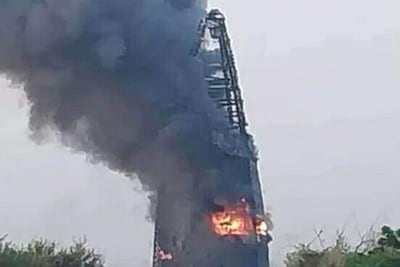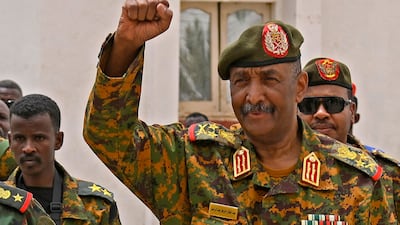Follow the latest news from UNGA
Sudan's military ruler Gen Abdel Fattah Al Burhan plans to attend the UN General Assembly in New York this week, a trip seen as an attempt to cement his position as the nation's legitimate leader.
It comes at a time when his army has been embroiled in a ruinous war since April against rival paramilitary the Rapid Support Forces.
Informed Sudanese sources said on Monday that Gen Al Burhan was expected to travel to New York on Wednesday after first visiting Saudi Arabia, a regional powerhouse that has long been among his country's major financial and political backers.
Saudi Arabia also joined the US in mediating a series of ceasefires between the army and the RSF in the early stages of the war.
The ceasefires were either completely ignored or not fully observed, forcing Riyadh and Washington to suspend their mediation until the two sides showed a genuine desire to end the war.
Gen Al Burhan's visit to Saudi Arabia and New York follows trips over the past month to Egypt, Qatar, Uganda, South Sudan, Turkey and Eritrea.
He has been based in the Red Sea city of Port Sudan since last month when he slipped out of Khartoum, where he had been trapped for nearly four months in a section of the armed force's headquarters controlled by the army.

The foreign visits have bolstered Gen Al Burhan's position as the internationally recognised leader of Sudan, but they also drew a sharp response from his nemesis and former ally, RSF commander Gen Mohamed Dagalo, who described the army chief's claim to legitimacy as “false”.
The RSF leader also threatened to create a rival government in Khartoum if Gen Al Burhan creates one in Port Sudan, warning that this would effectively divide the vast Afro-Arab nation of 48 million.
The RSF, he boasted, could march on Port Sudan if he gave the order. The paramilitary group was in near complete control of the capital, he said.
Port Sudan is about 1,000km east of Khartoum.
The RSF has escalated its attacks on army positions in Khartoum in recent days, something that analysts believe aims to secure battlefield victories that would undermine Gen Al Burhan's international standing.
That could subsequently give the RSF a strong hand if and when peace negotiations resume.
“There is a need to create a genuine government to replace the existing administration, which is mandated to run the country's day-to-day affairs,” said retired army Maj Gen Amin Magzoub, director of the Centre for Strategic and Security Studies in Khartoum.
“The continuing absence of a genuine government will put Sudan on the road to being a failed state.”
Gen Al Burhan and Gen Dagalo jointly seized power in 2021, toppling a civilian-led government and derailing Sudan's democratic transition. No government has been named since.
“The Rapid Support Forces, on the other hand, does not have the qualified personnel to create a government and, moreover, it's intensely resented by millions because of the looting and sexual assaults blamed on its fighters since the war began,” said Maj Gen Magzoub.
Osman Al Mirghany, a prominent Sudanese analyst, said Gen Dagalo's threats to march on Port Sudan or create a government were empty. The distance to the Red Sea port city would make the RSF's supply lines impossible to secure, he added.
He also suggested that Gen Dagalo's threat to create a government in Khartoum may have been inspired in part by the Forces for Freedom and Change, a pro-democracy alliance that partnered the army in the administration the two generals toppled two years ago.
“They (the FFC) sensed that an internationally recognised government in Port Sudan will leave them out and signal their exit from the nation's political landscape,” said Mr Al Mirghany.
Many in Khartoum, including Mr Al Mirghany, believe a significant FFC faction moved closer to the RSF in the months before the start of the war when the two generals publicly bickered over the assimilation of the RSF into the armed forces.
The sides also differed on the military's place in a democratic and civilian-ruled Sudan.

“Some in the FFC see benefits in an alliance or at least close ties with the RSF, mostly because of its vast monetary and material resources,' said Mr Al Mirghany.
The RSF, whose forerunner is a notorious militia active in Darfur in the 2000s, has over the past decade evolved into a well-armed and agile force of some 100,000 fighters. It has also amassed a vast wealth from gold mining, economic ventures and sending its men to fight in Yemen as part of a Saudi-led coalition against Iran-backed Houthi rebels.
The RSF has also responded this week to Gen Al Burhan's growing international stature with renewed attacks on the armed forces' headquarters, engaging the army in fierce fighting that, residents say, left several of the city landmark towers engulfed in flames.
Sudan's Foreign Ministry on Monday blamed the RSF for the fires.
The RSF has also been throwing significant resources into its repeated attempts to capture a key military base in Khartoum – the Armoured Corps in Al Shagara district – where it made inroads last month but has been met with stiff resistance.

